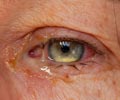Performing cataract surgery on Ebola virus survivors with impaired vision is safe and helps achieve vision restorative outcomes.

‘Cataract surgery helps improve vision care and quality-of-life for thousands of Ebola survivors at-risk for eye disease.’





An estimated 13 to 34 per cent of Ebola survivors have developed uveitis with varying degrees of severity ranging from mild disease to blindness. The eye is considered "immune privileged", in the sense that a virus can be cleared from the rest of the body while persisting in the ocular fluid.
Thus, invasive ophthalmic procedures on Ebola survivors possibly pose a risk to health care workers and other close contacts, said the researchers from the Emory University in the US.
In the study, reported in the journal EBioMedicine, a small number of Ebola virus disease survivors underwent cataract surgery with vision restorative outcomes.
The participants tested negative for Ebola virus in their ocular fluid-- in front part of the eye.
Advertisement
"These findings are truly exciting, as they improve our ability to impact vision care and quality-of-life for thousands of Ebola survivors at-risk for eye disease," said Steven Yeh, Associate Professor at the varsity.
Advertisement
However, the authors noted that they performed ocular fluid sampling in full personal protective equipment, and the research also provides a diagram showing the layout of the hospital, indicating where sensitive procedures were performed.
Source-IANS















